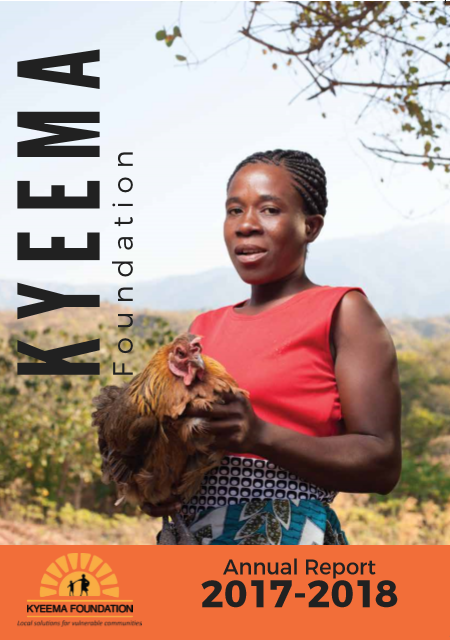Read the 2017-2018 Kyeema Foundation Annual Report
From the CEO
In November 2018, KYEEMA celebrates its 15th year as a registered charity in Australia. It’s been a journey of learning for the KYEEMA team and we’ve had many rewarding moments along the way. KYEEMA is unique in that we were expressly set up to work on village chicken health in developing countries. Even more specifically, we assist developing countries to make available a vaccine to smallholder family farmers against a killer disease of chickens – Newcastle disease. The vaccine was developed in Australia at the University of Queensland, with Australian government funding for the sole purpose of benefitting smallholder family farmers. Why village chickens? Because keeping them alive and healthy enables vulnerable families to have some control over their food security. Not only do chickens provide vital nutrition through their meat and eggs, surpluses can be traded to provide extra income or resources. Additionally, they are often used to fulfill social obligations and provide soil-enriching manure, are active pest controllers and used in many traditional ceremonies and treatments.
Over the past 15 years, we have worked with a wide range of counterparts in Africa to assist countries to make the vaccine against Newcastle disease and to train community vaccinators to keep their community’s chickens healthy. We estimate that today around 3-4 million families in southern Africa are benefitting from regular access to the vaccine, developed right here in Australia. This year I had a great opportunity to tell the KYEEMA story on ABC national radio thanks to the host Rhianna Patrick who wanted to know how this vaccine is helping rural African villages. You can listen to the interview here.
From our humble beginnings we have made strong inroads into making Newcastle disease vaccine available to smallholder farmers in several African countries. A prime example of this is in Tanzania, a country of almost 60 million people. The Tanzania Veterinary Laboratory Agency began trial work with the University of Queensland on the I-2 Newcastle disease vaccine in 1998. With ongoing support from KYEEMA for laboratory production, quality control and field application, the government produced over 36.5 million doses of I-2 ND vaccine last year. The vaccine is targeted for village chickens, which
comprise over 80% of the chicken stock in Tanzania. We estimate the vaccine is helping around 1.5 million families (or around 10.5 million people) in Tanzania alone each year. The government hopes to increase production to 100 million doses, in order to reach all those who need the vaccine. With childhood stunting rates estimated at 45% and an annual population increase of 3%, it is vital that affordable protein can be accessed by smallholder farmers and that they have chickens as a resource to help them through tough times.
In this past year, we have also been looking closer to home to support village chicken activities, based on requests we have received from Papua New Guinea. We are already partnering with an amazing NGO in Fiji on their ‘Happy Chickens’ project, which has been breeding and distributing village chickens and training communities in their management in Fiji and other Pacific Island countries. KYEEMA’s work has only been possible because of the valuable support we have received from our generous donors, sponsors and volunteers.
I thank you all sincerely for your support, which enables our mostly volunteer team to continue to
improve the lives of resource-poor women and children across Africa and the Pacific.
Celia Grenning


